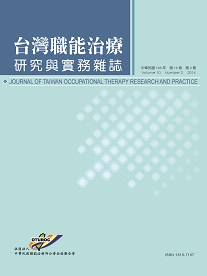Journal of Taiwan Occupational Therapy Research and Practice

半年刊,正常發行
背景及目的:工作價值觀是從事職業輔導評量工作時,通常用來評量身心障礙者的指標之一,但目前國內並沒有探討精神疾病患者工作價值觀之相關文獻或報告,本研究旨在探討精神分裂病患者之工作價值觀,以及探討不同背景之患者工作價值觀的差異。方法:本研究採用問卷調查法,使用吳鐵雄、李坤崇、劉佑星、歐慧敏(1995)所編定的工作價值觀量表作為研究工具,該量表有七個分量表,包括:1.自我成長取向;2.自我實現取向;3.尊嚴取向;4.社會互動取向;5.組織安全與經濟取向;6.安定與免於焦慮取向;7.休閒健康與交通取向。本研究邀請精神分裂病患者參與,比較參與者在七個取向的原始平均分數與標準差,探討不同性別、年齡、首次發病年齡、精神病史、工作經驗、學歷、病房別與婚姻狀況等的個人背景變項,在工作價值觀上的差異。結果:本研究共有111位精神分裂病患者參與,在七個取向的平均原始分數,最高為自我成長取向(26.7),最低為安定與免於焦慮取向(19.9),七個取向平均原始分數的百分等級皆在5以下,年齡、首次發病年齡、精神病史、性別、有無工作經驗、病房別等,與七個價值觀取向的原始分數皆出現顯著性差異。討論與建議:本研究結果顯示精神分裂病患者工作價值觀中,建議各取向的議題,皆應加入精神分裂病患者復健方案中,作為教導個案之重要觀念。未來研究建議應發展針對精神疾病患者適用之工作價值觀量表,以符合患者本身的特性及需求,才能滿足實務上之需要。
Background and Purposes: Work value is the key indicator for employment service staff when performing a vocational assessment for the mentally or physically challenged. However, currently in Taiwan, there was no literature or report exploring the work values of psychiatric patients. This research, therefore, attempts to understand the work values of persons with Schizophrenia, and how the seven aspects of work value differ demographically. Methodology: The research adopts the Work Values Inventory (WVI) developed by Wu Tieh-hsiung et al. WVI covers seven aspects, including 1) self-development, 2) self-achievement, 3) dignity, 4) social interaction, 5) organizational security and economics, 6) stability and anxiety exemption, 7) leisure, health, and transportation. There were 111 Schizophrenic clients who participated in the research. The average and standard deviation of the scores of the participants in the seven aspects were analyzed to determine the relations between work values and personal factors that include: gender, age, onset age, psychiatric history, work experience, educational level, wards classification, and marital status. Results: The research compares the average raw scores of the participants in the seven aspects. The participants scored the highest in self development aspect (26.7) and lowest in stability and anxiety exemption aspect (19.9). The percentile ranks of the average raw scores of the seven aspects were below 5. Personal factors, such as: age, onset age, psychiatric history, gender, and working experience generated significant differences in the raw scores of the seven aspects of work values. Discussion and Suggestions: The research results show that Schizophrenic clients do not obtain high scores in the seven aspects of work values. Consequently, these clients require improvements regarding the seven aspects of work values in achieving their vocational rehabilitation goals in Schizophrenia. Practically, the provision of appropriate treatment and rehabilitation programs for each patient is suggested, according to their wards classification, gender, age, onset age, and psychiatric history, to help them to establish work values.












